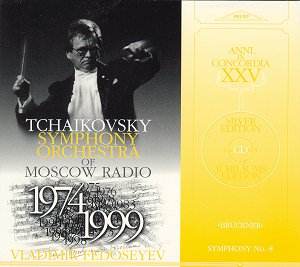This is another of
Relief’s series of CDs marking Vladimir
Fedoseyev’s first twenty-five years
at the helm of this orchestra. Next
year he’ll have been with them for thirty
years – quite a milestone. I’ve recently
enjoyed two companion releases, both
of which featured music by Tchaikovsky
[review
review].
How, I wondered, would conductor and
orchestra fare in Bruckner?
Unfortunately, the
documentation accompanying the CD is
extremely poor. Nowhere in the brief
notes is there any mention of the fact
that Bruckner’s Eighth exists in more
than one edition. Most recordings use
the critical edition by Robert Haas
of Bruckner’s revised 1890 score. This
performance by Fedoseyev uses the much
more rarely heard 1887 version of the
score. I presume that he has used the
edition of the score prepared by Leopold
Nowak as the music sounds the same as
on Georg Tintner’s traversal for Naxos,
which definitely uses Nowak’s edition.
(Unfortunately, I haven’t had access
to a score of the Nowak edition.) I
do feel that the choice of edition should
have been pointed out much more clearly
on the sleeve, as the 1887 version is
radically different to that of 1890.
There are a vast number of differences
between the two scores, many of them
obvious structural or thematic points.
Many others are much smaller details
of scoring but most are clearly audible
to those familiar with the 1890 version.
The 1890 version is also appreciably
shorter for, as Tintner points out in
a very useful note accompanying his
recording, Bruckner cut some 164 bars
of music from the 1887 score.
As far as I know there
have been only two other recordings
of the Nowak version. One, which I have
not heard, is from Eliahu Inbal’s cycle;
the other is by Tintner. I am wary of
"stopwatch" criticism. However,
the first thing to note is that there
is a massive discrepancy between the
length of Fedoseyev’s reading (74 minutes)
and Tintner’s, which comes in at 89’30".
So far as I have been able to tell from
purely aural comparisons both conductors
play the same text; in other words,
Fedoseyev makes no cuts. However, pretty
consistently the Russian conductor adopts
swifter tempi.
Actually, with the
exception of the third movement, the
basic tempi that each conductor chooses
in each movement are not radically different.
However Tintner is much readier to adopt
a slower pace for subsidiary tempi.
Thus, for example, in the finale Fedoseyev
reaches the start of the build up to
the concluding peroration after 18’50".
Tintner, having savoured more detail
along the way, reaches the same point
after 22’03". Now, you may find
Tintner’s approach too indulgent but
I felt that, despite a penchant for
broader tempi, he was much more in command
of the structure and of the atmosphere
of the work. So, in this final peroration
there is no doubt at all in my mind
that it is Tintner who properly conveys
the necessary sense of initial mystery
and then of concluding majesty. Also,
he handles the "simple" matter
of the final chords more satisfyingly
to my ears than does his Russian rival.
I’m afraid that on
several occasions during the whole symphony
I felt that Fedoseyev’s approach sounded
episodic and "stop-start"
with too little sense of overall structural
grip or flow. In his defence, I must
say that Bruckner doesn’t make things
at all easy for conductors; the original
version of the score does not have the
thematic or developmental cohesion that
we find in the 1890 revision which,
in all four movements sounds far more
tight and cohesive.
There is one significant
way in which some listeners may feel
that Fedoseyev is to be preferred over
Tintner. This concerns the performance
of the third movement. Tintner takes
no less than 31’10" to play this
great adagio. In Fedoseyev’s hand the
same music plays for a "mere"
22’10". I can imagine that some
may find Tintner’s spaciousness here
just too much of a good thing although
I find that his focused concentration
convinces me. Fedoseyev has more sense
of forward momentum and some may well
prefer this. I’m bound to say, however,
that for me much of the good work he
does in this movement is undermined
by the speed adopted for the wonderful
coda. In his performance it is just
too swift and as a result the music
sounds matter-of-fact and almost perfunctory.
The Russian orchestra
generally plays well though I think
the National Symphony Orchestra of Ireland
serve Tintner’s conception just as well.
The sound is perfectly good, if unexceptional
(Naxos for Tintner is better, I feel.)
As I’ve indicated, the notes are pretty
useless.
Collectors wanting
just one recording of the symphony for
their collection should undoubtedly
plump for the 1890 edition. The 1887
version of the score is interesting
and Bruckner enthusiasts will want to
hear it. However, it would be perverse
to recommend this Russian performance
in preference to the authoritative Tintner
reading. If you want the 1887 score
then the choice is clear.
John Quinn
